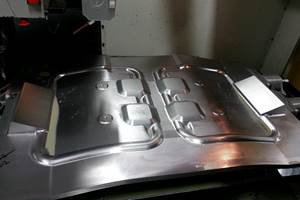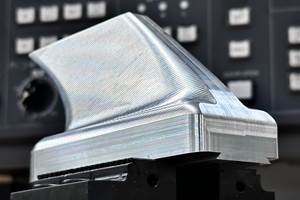10 Reasons Why Machine Shops Vary So Much in Quoted Pricing
Many factors explain the potential 10X variation in different shops’ bids for the same machining work.
Share


Hwacheon Machinery America, Inc.
Featured Content
View More

.png;maxWidth=45)
DMG MORI - Cincinnati
Featured Content
View More


ECi Software Solutions, Inc.
Featured Content
View MoreI recently assisted in a project conducted by Gardner Intelligence, the research group within Modern Machine Shop publisher Gardner Business Media, which involved analyzing the machining costs of various part types. I asked several shops to provide quotes on certain parts, and thus encountered the predicament that buyers of machined parts routinely see: a wide range of prices. There is no simple answer to the question, “How much does it cost to machine this part?”
MakeTime has seen the same thing. This company, which is in the business of matching shops with customers, cites research finding a factor-of-10 discrepancy in quoted prices for identical machining work. Aiming to simplify costing, the company recently introduced a “network pricing” feature that can estimate a part’s machining cost based on MakeTime’s history and analysis of the costing of similar parts.
I recently asked MakeTime Director of Fulfillment Justin Hosley about the pricing discrepancy. Having previously worked in business development for a machine shop, he holds the view that there is no single explanation, but instead a variety of factors. His list is below, followed by a few additions of mine. Why do shops’ prices differ widely? Here are some reasons:
1. Capabilities. Many shops could make the part to print, but not all would employ equally sophisticated resources. The difference between five-axis machining and many setups on a simple mill affects price. So does the presence of in-house grinding rather than outsourcing this work.
2. Regionality. The presence of certain industries in a region bids up the local price. A shop in a rural area might comfortably quote a lower price than a shop in an area full of aerospace suppliers.
3. Capacity. Busy shops bid higher. (Since MakeTime’s pricing model is based on current open capacity, it sees this variation every day.)
4. Interpretation. Two shops can interpret the same job differently. The one that knows the customer well might know that some details of the print do not matter. The new supplier does not know what to ignore.
5. Automation. On higher-volume jobs, differences in labor cost affect pricing substantially.
6. Process. The experienced or clever engineer or machinist might see a more efficient way to set up or run the job than other bidders.
7. Relationships. Mr. Hosley has experienced this one. The 60-year-old shop he worked for could get better pricing on material than other, newer shops.
That is his list. I will add three more of my own:
8. Envelope. A given shop frequently is best adapted to run parts within a given size range, whether large or small. Competitively running parts outside this scale is difficult.
9. Qualification. If a shop has the assets qualifying it for a specific industry—think auditing staff, special machines or inspection capabilities—then it seeks to cover the cost of these assets even in work outside of that industry.
10. Error. Shops make mistakes in their quoting. Sometimes the reason behind a low bid is simply a shop that will be fortunate not to win that job.
Related Content
4 Tips for Staying Profitable in the Face of Change
After more than 40 years in business, this shop has learned how to adapt to stay profitable.
Read MoreHow to Determine the Currently Active Work Offset Number
Determining the currently active work offset number is practical when the program zero point is changing between workpieces in a production run.
Read MoreCustom Workholding Principles to Live By
Workholding solutions can take on infinite forms and all would be correct to some degree. Follow these tips to help optimize custom workholding solutions.
Read MoreWhat are Harmonics in Milling?
Milling-force harmonics always exist. Understanding the source of milling harmonics and their relationship to vibration can help improve parameter selection.
Read MoreRead Next
Registration Now Open for the Precision Machining Technology Show (PMTS) 2025
The precision machining industry’s premier event returns to Cleveland, OH, April 1-3.
Read MoreSetting Up the Building Blocks for a Digital Factory
Woodward Inc. spent over a year developing an API to connect machines to its digital factory. Caron Engineering’s MiConnect has cut most of this process while also granting the shop greater access to machine information.
Read MoreBuilding Out a Foundation for Student Machinists
Autodesk and Haas have teamed up to produce an introductory course for students that covers the basics of CAD, CAM and CNC while providing them with a portfolio part.
Read More













































